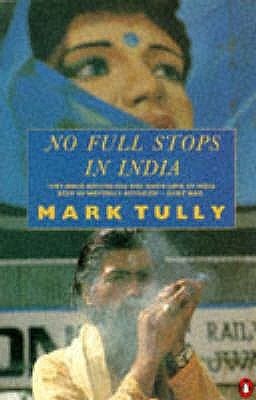While I was finishing school and getting into college, this was the man whose English and politics was what I loved to hear and read about. Getting that opportunity was not very easy, though. This is about life in Cuttack, Orissa of the Seventies. Catching BBC was prized and something to boast about amongst friends. We could understand what he spoke - an accent one related to easily. Reading, Mark Tully in one of the dailies or in some magazine was celebration. Nothing or no one could be better for us natives. .Later on, the days of the television, though, made him so much more familiar.
"No Full Stops in India”
Having done his schooling and for the better part of his professional career being posted
In India Mark takes us on a special journey which most of us Indians are yet, to make. Not quite the sophisticated and erudite discovery that of a Nehru or the utter prostrations of anything British a la Nirad Babu but more akin to the simple and natural R K Laxman .Slowly but surely, he leads you on through the eyes of his “help” Ram Chander to the heart of India- Gavvan Village close to lucknow :Taxi stands, potholed roads, tractors carrying generators and tables and chairs, the marriage ceremonies of Ram and the stay in the harijan basti with Gillian, his companion, the Indian whiskies, the cheap country liquor and open air latrines. All along you enjoy the ride, never suspecting the felicity and feeling with which Mark introduces you to your very own darkest subject that of the Harijan, their lives and society.
He talks of the “new colonialism” of preventing the development of a native Indian self confidence thru’ the conflicts and dilemmas, of the famed sculptor Stapati with the equally famous Stephen Cox, of Father Kunakkals’ principled defence of Hindi as the language for national Identity and the harm caused by English to the latter and the difficulties in the emergence of the Dalit Christians and a new theology. He underlines with deep felt conviction that religion did not make communities communal on the basis of the spectacular success of the Ramayana serial across religious divides. On the contrary, the westernized import of secularism was ill suited to the needs of modern India, he avers.
A first hand account of Operation Black Thunder unravels all the pain and travails of the modern Sikh youth and the hapless flip flopping of the Congress party in resolving the Sikh Militancy. The Red Bengal gets a sympathetic ear along with a radical view on the “Deorala affair” and the rise of women empowerment. The humongous and utterly incredible throng of Indian Sadhus in Kumbh Mela is counterposed by the more sad and sobering existence post the communal riots in Gujrat.He sees very early the tragedy of the Tribal and sensitively talks of the challenges ahead in the mines and forests of Central India while interacting with their authentic wards. Finally, he meets his great friend Digvijay Singh of Bihar to round off his politico-social travelogue to convince us all of the need “of a modern order but not a slavish imitation of other”
Each chapter is a theme of modern India, written exquisitely and graphically enough to be filmed. Another “Bharat Ek khoj” perhaps. Every Indian needs to read and own a copy to understand the growth and history of the modern Indian society. Everyone else, too : to notice the lack of any condescension, arrogance or superciliousness in the understanding of India as a nation and society.

No comments:
Post a Comment